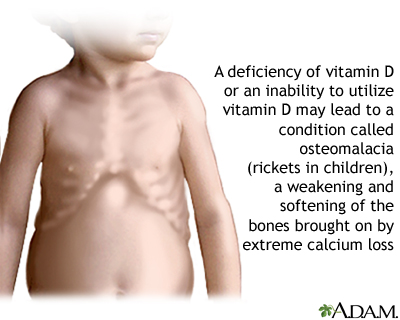Rickets

What is Rickets?
Rickets is a skeletal disorder that's caused by a deficiency of vitamin D, calcium, or phosphate, leading to soft and weak bones in children.
Who’s at Risk for Rickets?
Children who do not get enough vitamin D, either from their diet or exposure to sunlight, are at risk for rickets. Those with darker skin, as well as those living in northern latitudes or high pollution areas, are also at higher risk.
What Causes Rickets?
Rickets is primarily caused by a deficiency in vitamin D, which is essential for the absorption of calcium and phosphate in the bones. It can also be caused by genetic disorders or certain medical conditions that affect vitamin D metabolism.
How Does Rickets Start?
Rickets starts with inadequate mineralization of the growth plate in children's bones due to the deficiency of vitamin D, calcium, or phosphate.
What Are the Symptoms of Rickets?
Symptoms of rickets may include delayed growth, pain in the spine, pelvis, and legs, muscle weakness, and skeletal problems such as bowed legs or deformities of the chest and skull.
How is Rickets Diagnosed?
Rickets is typically diagnosed based on symptoms, physical examination, and medical history. Blood tests and X-rays can also help confirm the diagnosis.
How Can Rickets Be Treated?
Treatment for rickets includes replacing the deficient minerals and vitamins, usually through dietary changes and supplements. In severe cases, surgery may be required to correct bone deformities.
What Complications May Occur with Rickets?
If left untreated, rickets can lead to severe bone deformities, growth failure, and in rare cases, heart and lung complications.
How Can I Prevent Rickets?
Prevention of rickets involves ensuring adequate intake of vitamin D and calcium, through diet, sunlight exposure, and supplements if necessary.
Long-term Management of Rickets
Long-term management involves regular follow-ups with the doctor to monitor growth and bone development, and to adjust dietary and supplement regimens as necessary.
What is Recent Research Saying About Rickets?
Recent research is focused on better understanding the role of vitamin D in bone health, exploring potential genetic causes of rickets, and improving methods of prevention and treatment.
Where Can I Go For More Information on Rickets?
For more information on rickets, visit reputable health websites like the American Academy of Pediatrics (Healthy Children), the Mayo Clinic, or the National Institutes of Health.

